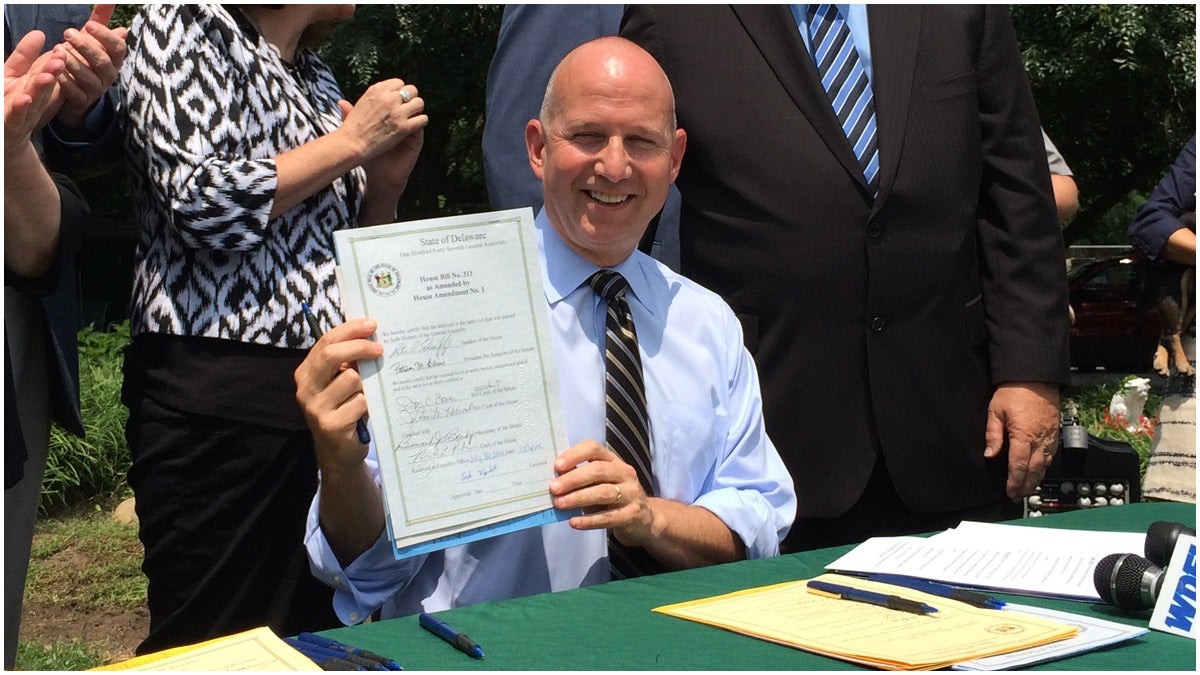Delaware governor signs animal welfare bills

(Shirley Min/WHYY)
On Thursday, Gov. Jack Markell signed into law four pieces of legislation designed to strengthen protections for animals.
“These new policies further protect animals and people who are vulnerable in our community,” said Markell, who was flanked by state lawmakers and animal welfare advocates at the Delaware Humane Association in Wilmington. “It is a tremendous step forward for Delaware.”
Senate Bill 201 tasks the newly-created Office of Animal Welfare with managing the state’s shelter standards law and the spay/neuter program. The measure also shifts oversight of animal welfare programs from the Dept. of Agriculture to the Dept. of Health and Social Services.
“The Dept. of Agriculture did a great job managing not only their primary responsibility of dealing with livestock and poultry issues, but also companion animal issues,” said Hetti Brown, executive director of the Office of Animal Welfare. “But the animal welfare task force recognized many areas it needed just more vast attention, and that’s why the Office of Animal Welfare was formed, and that’s why we’re now managing those programs.”
Dept. of Health and Social Services Secretary Rita Landgraf explained that the OAW became part of the DHSS a year ago. In that time, she has witnessed the importance of pet ownership first-hand.
“From pet therapy dogs and cats in nursing homes and hospitals, to guide dogs for people with disabilities, to the everyday family pets looking for homes, across the spectrum, animals truly deserve our respect and protection.”
House Bill 311 requires that all of the state’s animal control officers and animal cruelty investigators undergo uniform training and certification.
Over the next several months, the OAW will draft procedures and regulations for SB 201 and HB 311 that concern shelter inspections, complaint investigation and animal control officer certification.
Senate Bill 245 protects animals seized in criminal activity, cruelty situations and animal fighting from automatic euthanasia, instead allowing for evaluation of animals for adoptability by trained personnel. Delaware was one of only 13 states to mandate euthanasia without any sort of evaluation. The bill also ensures that the owners or anyone involved in the abuse of the animals can not adopt the animals after their seizure.
House Bill 297 clarifies when an animal control constable or dog warden may impound a dog that is suspected of being dangerous or potentially dangerous. The measure strengthens the existing Dangerous Dog Law.
“This is an amazing day for us and for animals across Delaware, and really the accumulation of a lot of hard work and collaboration with many animal protection organizations and government agencies, which we haven’t had that coordination necessarily always in the past, but now we do,” Brown said.
In the past, Kevin Usilton, executive director of the First State Animal Center and SPCA, often disagreed with state lawmakers on animal welfare issues, particularly when it came to animal control policy. The Kent County-based shelter handles animal control duties statewide.
“I think that these bills are fine. We’ve worked with two of them to make sure that they’re helping. We’re thankful for the support from the state for our cruelty program and for making sure that all animals are fairly treated when they are pulled for dog fighting, so we’re happy with those bills,” said Usilton, who is waiting to see how the shelter standards and dangerous dog laws develop.
Usilton, meantime, said he has asked the OAW to launch a statewide public education campaign.
“Almost 80 percent of the animals we see at animal control are not spayed and neutered, they’re not vaccinated, they’re not wearing a collar, so let’s get our public on board with what the shelters want to do, and then our state is going to be awesome,” said Usilton, who would also like to see the OAW address the issue of cats in Delaware. “Cats are second-class citizens and nobody recognizes them. If you find a stray cat, there’s no resource for you to turn to.”
WHYY is your source for fact-based, in-depth journalism and information. As a nonprofit organization, we rely on financial support from readers like you. Please give today.





